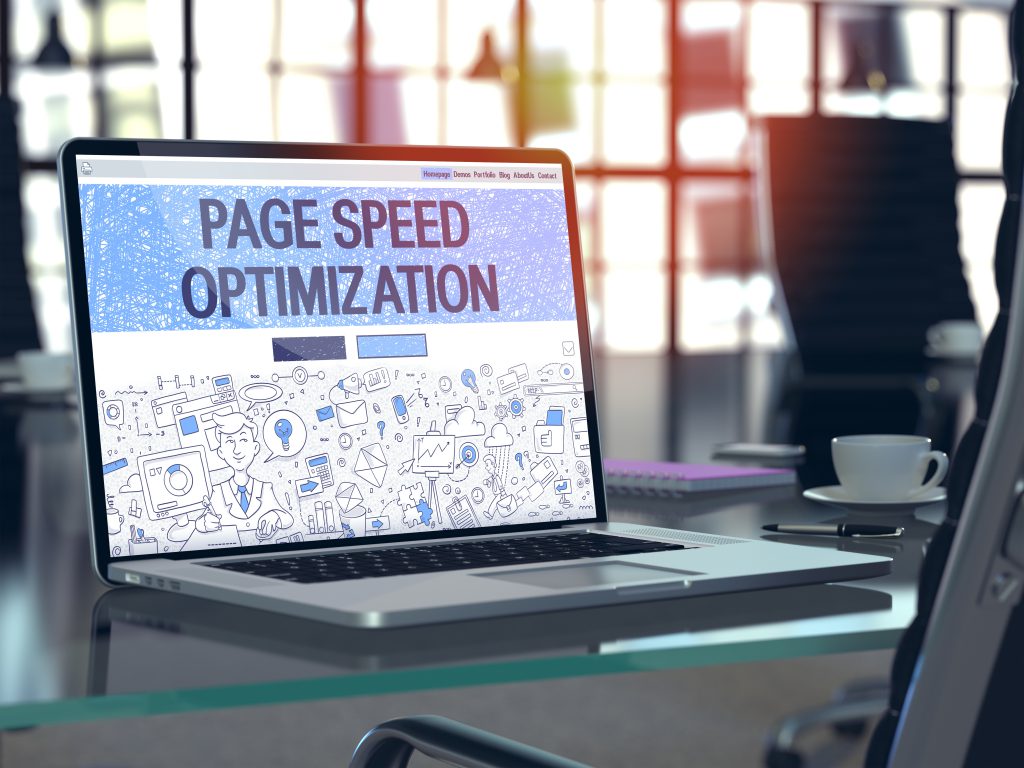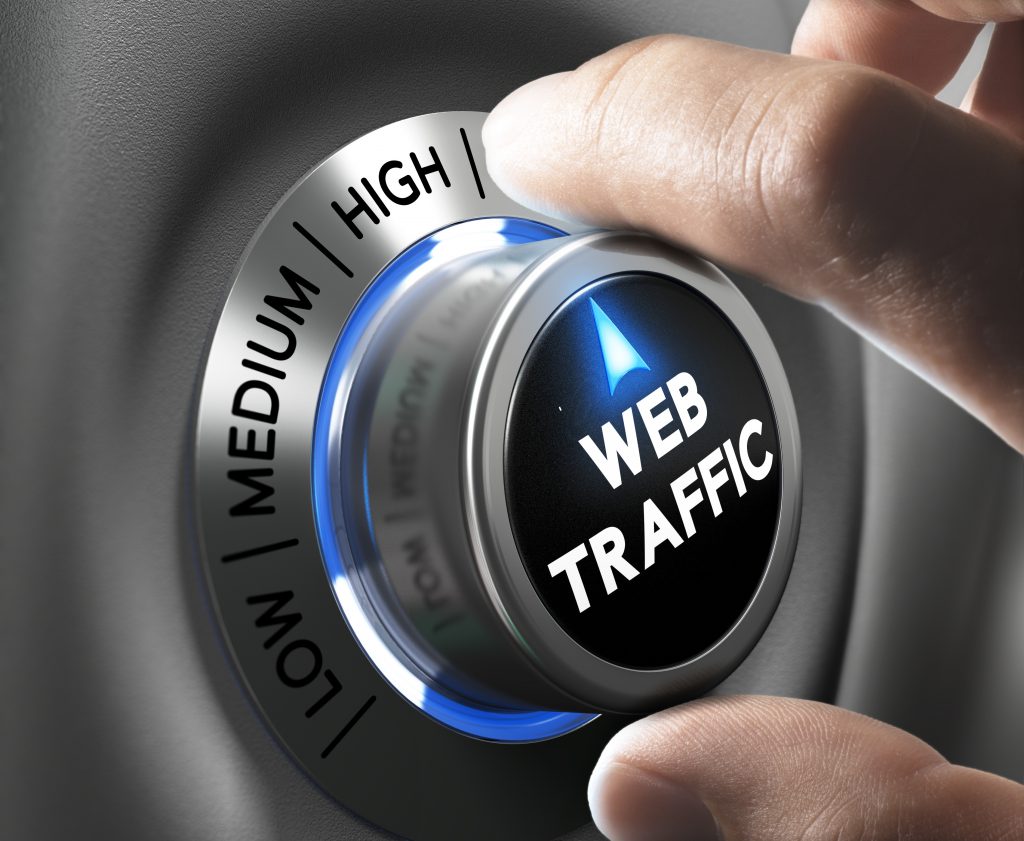What is Page Speed?
Page speed is an important element search engines use when determining your site’s ranking. It is the amount of time it takes for a web page to load.There are multiple factors that search engines use when crawling your site to determine your page speed. Each of the three elements below are analyzed by search engines simultaneously to establish your page’s speed.
Fully Loaded Pages
This is how long it takes for every component of your web page to fully load, including all scripts and HTML functions. Determining your fully loaded pages time is an important and straightforward way to begin diagnosing the speed of your pages, but it’s not all you’ll need to do.
Time to First Byte
Time to First Byte measures the amount of time it takes for your page to begin the loading process. It is the amount of time the web browser waits before receiving the first byte of data from the server. If you’ve ever clicked on a webpage and stared at a white screen for a few seconds, that was the time to first byte.
First Contextual Paint
The First Contextual Paint, also referred to as the First Meaningful Paint, is the amount of time it takes your webpage to load enough resources that it can be successfully read. Depending on the amount of codes, images, Javascript, and other elements you have incorporated within your page, this could take multiple seconds. All three of these elements are used in tandem by search engines to determine your site’s page speed. But why is page speed important when dealing with SEO?
Page Speed and SEO
Throughout the past decade, Google (and other search engines like Bing, GoDaddy, and Yahoo) have been placing an increased importance on page speed when determining your site’s ranking. Since search engines want to deliver the strongest user experience possible, slow websites and pages have begun negatively impacting a site’s ranking. No one wants to spend seconds waiting for a page to load when the SERP (Search Engine Results Page) has thousands of other results that hopefully won’t take as long to load. As we get into 2020, Google has alerted us that they have begun placing an increased importance on mobile sites, since an increased percentage of web activity is coming from mobile devices. When determining your page speed, Google has started Mobile-First Indexing. This means that they will be looking at your site’s speed through mobile before desktop. You can have two drastically different page speeds depending on whether your site is being viewed on desktop and mobile. Both are certainly important, but you’ll want to give extra attention to your mobile site’s performance, as that is what Google will be using first when ranking sites.
How Do I Improve My Page Speed?
While there is no one set way to increase your page speed, there are many page speed optimization best practices that, when performed together, can speed up your website’s load time. However, the most important step in improving your site’s speed is to run a page speed test.
Page Speed Test
Google Pagespeed Insights is a valuable resource all web developers should be taking advantage of. Once you input your page’s URL, the program will analyze your page speed and present you with a report. Since mobile-first indexing has already begun, the program defaults to providing you with your page’s mobile speed. On the top left corner, you’ll have the ability to toggle between your site’s mobile and desktop versions, so you can improve the speed of both. Google Pagespeed Insights also provides users with a report of potential issues, but depending on your history of web development, you might not be sure how to implement these improvements.
Enable Compression
Every individual image on your webpage needs to fully load. Depending on the size of your images and the amount you have on your webpage, they could be slowing your site down. There is a quick and easy fix to this that, once implemented, will yield almost instant results. Inspect each of your images. If any are over 150 bytes, reduce them to a smaller, more manageable size. This can be done manually within your computer’s photos, or you can enable a WordPress plugin, like Imagify or WP Smush Image, to automatically perform this function. With smaller, more compressed images, your site will be able to load faster, delivering a stronger user experience and improving your overall page speed. Reduce the size of CCS, HTML, and Javascript that are over 150 bytes. The smaller they are, the quicker they’ll load.
Remove Unused Code
As your website evolves, your code may have been updated. Elements may have been swapped out, pages may have changed, or a more efficient way to present information could have been found. This is natural, as no successful website remains static for long; a successful site is always improving and updating. Look through your website’s back end, paying close attention to your HTML, Javascript, and CSS. If there are any codes or scripts that are no longer being used on the page, remove them immediately! The browser will go through all codes and scripts and perform all of the actions indicated within them before your page is fully loaded. If the code or script is not needed, there’s no sense in wasting pagespeed time by waiting for them to load. Simply removing unnecessary scripts and unused codes will help boost your site and page speed.
Enable Browser Cache
Enabling caching on your website can help improve page speed. When you load a webpage for the first time, the browser and server connect as the browser downloads each element of the page and loads it within your browser.As we said before, loading each element can take time, so enabling caching can help reduce load time for repeat visitors. Simply put, caching allows the browser to store the page information so that the next time a visitor comes back to the page, it will load faster because the information is already saved. WordPress offers various plugins that let you enable cache and determine how long the information is saved, including W3 Total Cache and WP Super Cache.
Remove Render-blocking Javascript
To render means to load, so render-blocking Javascript refers to any script that is stopping the page from loading as quickly as it can. If the browser runs into a script as it’s loading, it has to stop to read and perform functions in the script before it can continue loading the overall page. Depending on the specific script, this could take a long time and drastically affect your page speed. Thankfully, the Google Pagespeed Insights program will list out the specific webpages with render-blocking Javascript. Inspect each of the pages listed and look for all scripts that could be taking too long to load.Identify whether they are necessary during a reader’s first interaction with a site. Chances are, the specific Javascripts that are causing your website to load slowly can be either changed to a more load-friendly script or moved to another webpage/If you are running your site through WordPress, there are a variety of plugins that can assist in removing any Javascript that is impacting your page speed. You can consider installing Hummingbird, Asset CleanUp, Pagespeed Ninja, or one of their many other tools.
Improve Server Response Time
Your web server could be causing your page speed to decrease. You’ll want to take a look at your server and make sure it is running as efficiently as possible. Keep an eye out for common server issues like low database queries, low memory, and slow routing.If you notice multiple server errors happening with increased frequency, you may want to consider switching servers. A fast server is the most important element when search engines determine your time to first byte, so by improving your server, you might see a drastic improvement in your page speed. Each of these individual elements could be causing your web pages to load slowly, so you’ll want to pay special attention to each of them. Since your website is constantly evolving, this is not a one-and-done situation. You should always be considering your page speed when incorporating anything within your site, as page speed is a huge factor in search engine’s ranking.9Sail is a search marketing firm that combines search engine optimization and pay-per-click management to help businesses solve their issues with lead generation, brand awareness, reputation building and management, and more. At 9Sail, our team is fully dedicated to optimizing your site in every way. We are fully trained to sweep sites to improving page speeds, and will happily do so for your site. If you’re interested in learning more about increasing your site’s page speed, drop us a line!
Helpful resources
Discover the power of effective digital marketing.
Sign up to receive 9Sail’s exclusive content and tactical tips, focused on helping law firms grow.
9Sail takes your privacy seriously and will only use your personal information to deliver communications you have requested of us. You can change your preferences at any time.



